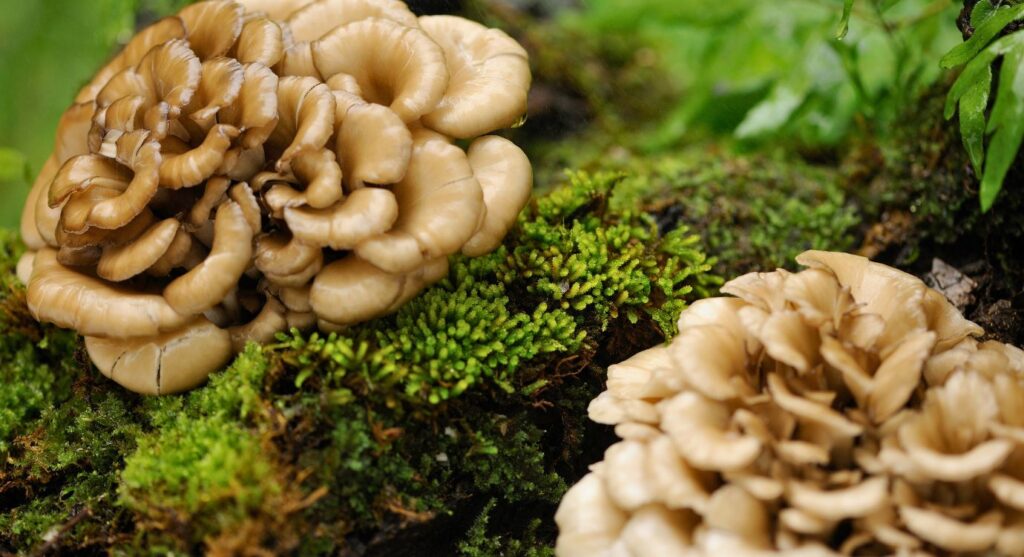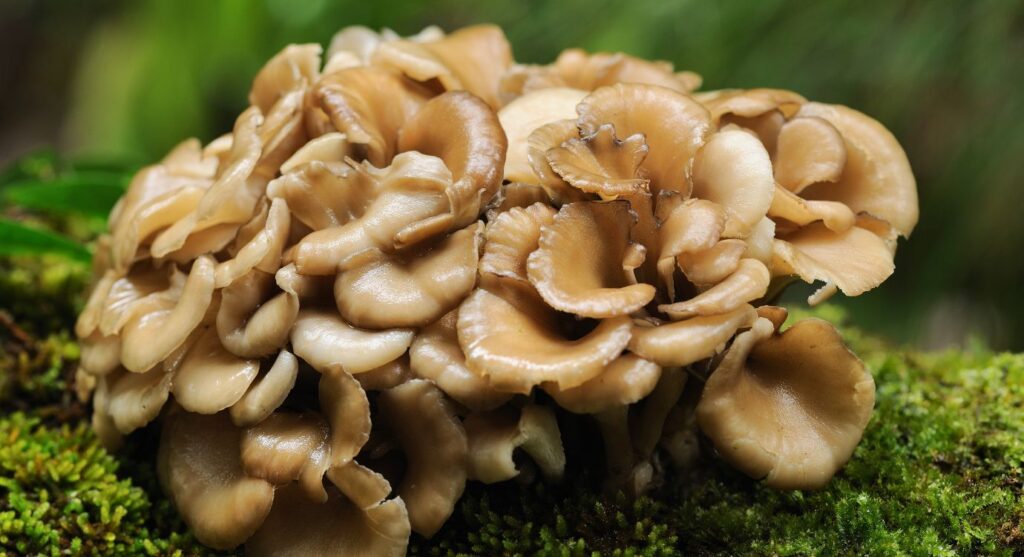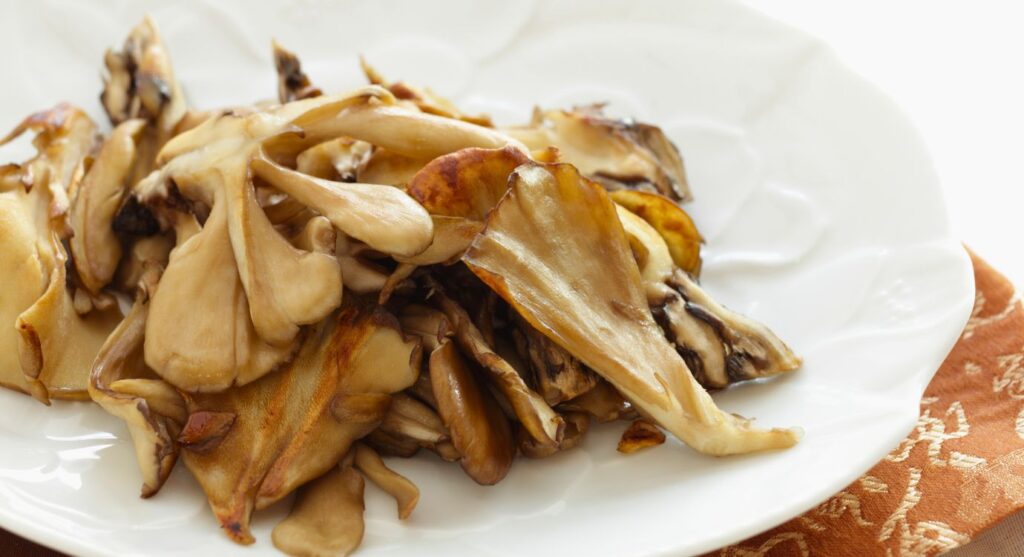Free delivery on all orders over £45
Free delivery on all orders over £45

Medically reviewed by
Maitake mushrooms, also called “hen of the woods,” are a type of adaptogen that has been used for medicinal purposes for centuries.
It’s difficult to pinpoint exactly when maitake mushroom was first discovered, however, it was not until the 1980s that the scientific community began to take notice of maitake’s potential health benefits.
Since then, maitake has gained popularity as a superfood and natural remedy in the West and continues to be an area of active research in the field of mycology (the study of fungi).
So, if this mushroom has grabbed your attention, and you want to learn more about Maitake mushrooms, you’re in the right place.
In this guide, we’ll delve into:
Maitake mushrooms, also known as Grifola frondosa, are a type of edible fungi that grow in clusters on the roots of trees, particularly oak trees.
These mushrooms have a unique appearance, with multiple overlapping caps that resemble the feathers of a hen, which is what gave them their nickname “hen of the woods”.
Maitake mushrooms have a long history of use in traditional Chinese and Japanese medicine.
They were first recorded in ancient Chinese medical texts as far back as the Han Dynasty (206 BCE-220 CE), where they were recommended as a tonic for overall health and longevity.
In Japan, maitake mushrooms were traditionally used to treat a range of ailments, including high blood pressure, diabetes, and digestive issues. They were also believed to have spiritual properties and were often used in religious rituals and ceremonies.
It wasn’t until the 1980s that researchers began to take a closer look at the potential health benefits of maitake mushrooms. And in 1984, a team of Japanese researchers discovered that extracts from maitake mushrooms could stimulate the immune system in mice.
This finding sparked interest in the potential anti-cancer properties of maitake, and subsequent studies have suggested that maitake may have a range of other health benefits as well.

Maitake mushrooms offer several potential benefits for human health. One of its most significant benefits is its believed immune-boosting properties.
This is due to the high concentration of beta-glucans in maitake mushrooms, which can help stimulate the immune system and improve its ability to fight off infections and diseases.
Additional health benefits of maitake include:
Maitake mushrooms contain various bioactive compounds, such as beta-glucans, which have been shown to have anti-cancer properties.
The beta-glucans in maitake mushrooms stimulate the immune system, which helps the body to identify and destroy cancer cells.
Additionally, maitake mushrooms may inhibit the growth of cancer cells by inducing apoptosis (cell death) in these cells.
Certain studies have even suggested that maitake mushrooms may also help reduce the side effects of chemotherapy and improve the quality of life for cancer patients.
However, Maitake should not be seen as a treatment for cancer, and anybody undergoing chemotherapy should speak to a medical professional before using Maitake mushrooms.
If you’ve been looking to shed some pounds, consider incorporating maitake mushrooms into your diet. These mushrooms offer multiple potential benefits for weight management.
Firstly, they are low in calories and fat, making them a good food to include in a weight loss diet. With only 25 calories and less than half a gram of fat per cup of maitake mushrooms, they are a satisfying and guilt-free food choice.
Furthermore, maitake mushrooms are high in dietary fibre, which can help increase feelings of fullness, making you eat less and reduce your overall calorie intake.
Additionally, maitake mushrooms may positively impact metabolism and blood sugar regulation, which can indirectly support weight loss.
Maitake mushrooms contain compounds called alpha-glucosidase inhibitors that can slow down the absorption of carbohydrates in the gut. This means that the body takes longer to break down complex carbohydrates into glucose, which can help prevent spikes in blood sugar levels after meals.
Moreover, maitake mushrooms contain compounds that can help improve insulin sensitivity and reduce insulin resistance. Insulin resistance hinders the body’s ability to regulate blood sugar effectively, leading to elevated levels.
So, by keeping blood sugar levels stable and insulin levels low, the body is more likely to utilise stored fat as an energy source rather than storing excess calories
Lastly, studies suggest that maitake mushrooms enhance energy expenditure by increasing the activity of brown adipose tissue, which helps burn calories to generate heat. By boosting energy expenditure, maitake mushrooms have the potential to aid in burning more calories and supporting weight loss efforts.

Maitake can help support your heart health through various means.
The first way is by helping the body to lower cholesterol levels. High levels of cholesterol in the blood are a risk factor for heart disease, and research has shown that compounds in maitake mushrooms, such as beta-glucans, may help to lower LDL (“bad”) cholesterol levels.
In addition, maitake mushrooms contain antioxidants, which are beneficial compounds that can help to protect the heart and cardiovascular system from damage caused by free radicals. Free radicals are unstable molecules that can damage cells and contribute to the development of heart disease.
Maitake mushrooms also contain potassium, a mineral that is essential for heart health. Potassium helps to regulate blood pressure and can help to reduce the risk of heart disease and stroke.
Finally, maitake mushrooms have anti-inflammatory properties, which can also be beneficial for heart health. Chronic inflammation has been linked to the development of heart disease, and beta-glucans in maitake mushrooms have been shown to have anti-inflammatory effects.
Read more: Mushrooms for inflammation
Maitake mushrooms can be beneficial on so many levels, but they also have the potential to cause side effects in some people.
However, side effects are relatively rare and often depend on factors such as an individual’s health status, dosage, and frequency of consumption.
If you experience any adverse effects from maitake mushrooms, it’s important to stop using them and seek medical attention if necessary.
Some of the known side effects and potential risks associated with consuming maitake mushrooms include:
Maitake mushrooms are very versatile and can be consumed in a plethora of ways.
Maitake mushrooms offer a delightful culinary experience with their rich, meaty flavour and firm texture.
For quick and delicious preparation, saute or stirfry sliced maitake mushrooms in a pan with butter or oil. Cook them until they are tender and lightly browned, and season with salt, pepper, garlic, and other herbs and spices.
Maitake mushrooms can also be roasted in the oven, which brings out their natural sweetness and enhances their flavour. Preheat the oven to 375°F, coat the mushrooms with oil and seasonings, and roast them for 15-20 minutes until they are golden brown and crispy on the outside.
Grilling maitake mushrooms is a great way to infuse them with a smoky flavour and give them a slightly crisp texture. Brush the mushrooms with oil or marinade, and grill them for 3-5 minutes on each side over medium heat until they are tender and golden brown.
Maitake mushrooms are also commonly used in Japanese and Chinese soups, where they add flavour and nutrition. They can be added to miso soup, chicken soup, vegetable soup, or cooked in a dashi broth with other ingredients.

Maitake mushroom tea is a traditional Japanese drink that is made by simmering the mushrooms in water for several hours. The resulting tea has a savoury, earthy flavour and is believed to have immune-boosting properties.
Read more: Mushroom tea
Maitake mushroom powder is made by drying and grinding the mushrooms into fine powder. This can be done at home, or you can buy pre-made powders. The powder can be added to smoothies, soups, and sauces or sprinkled over salads as a nutrient-dense seasoning.
Maitake mushroom tincture is a concentrated liquid extract that is made by steeping the mushrooms in alcohol or glycerin. The tincture can be taken orally, added to beverages or used in cooking, and is believed to have immune-boosting and other health benefits.
The appropriate dosage of maitake mushroom varies depending on several factors such as age, health status, and the reason for taking it.
The quality and potency of maitake mushroom supplements can vary between brands, so it is important to choose a reputable brand and follow the manufacturer’s recommended dosage instructions to ensure safety and effectiveness.
Its also advised to consult with a healthcare professional before taking maitake mushroom. They will be able to guide you on correct dosages and uses for your needs.
The following dosages are general guidelines and may not be appropriate for everyone:
The recommended dosage of maitake mushroom extract for immune support is 500-1,500 mg per day, divided into two or three doses. This can be in the form of capsules, tablets, or liquid extracts.
Maitake mushroom extract has been studied for its potential to improve blood sugar control in people with diabetes. The recommended dosage for this purpose is typically 1-3 grams of maitake mushroom extract per day, divided into two or three doses.
Some studies have suggested that maitake mushroom extract may help with weight loss by reducing fat storage and increasing energy expenditure. The recommended dosage for this purpose is typically 3 grams of maitake mushroom extract per day, divided into two or three doses.
Maitake mushroom extract has been studied for its potential to support cancer treatment by boosting the immune system and reducing the side effects of chemotherapy.
The recommended dosage for this purpose may vary depending on the individual’s cancer type, stage, and treatment plan. It is important to consult with a healthcare provider before using maitake mushrooms for cancer treatment support.

While maitake mushrooms are generally considered safe, there are certain groups of people who should best avoid them, including:
Maitake mushrooms offer several potential health benefits and have been used for medicinal purposes for centuries.
They have been shown to have immune-boosting properties, anti-cancer properties, weight loss benefits, and cardiovascular support. The beta-glucans found in maitake mushrooms are responsible for many of these benefits.
However, it is important to note that maitake mushrooms may not be suitable for everyone, and there are some potential side effects associated with their use.
Overall, maitake mushrooms are a promising natural remedy that continues to be an area of active research in the field of mycology.
10% off on your first order
Complete this one-minute quiz and find the right products for you.
Sign up for the Evopure newsletter:
This product is not for use by or sale to persons under the age of 18. It should not be used if you are pregnant or nursing. Consult with a physician before use if you have a serious medical condition or use prescription medications. A Doctor’s advice should be sought before using this and any supplemental dietary product. This product is not intended to diagnose, treat, cure or prevent any disease.
© Evopure Ltd. All rights reserved Terms & Conditions Cookie Policy Sitemap